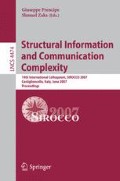Abstract
A large group of autonomous, mobile entities e.g. robots initially placed at some arbitrary node of the graph has to jointly visit all nodes (not necessarily all edges) and finally return to the initial position. The graph is not known in advance (an online setting) and robots have to traverse an edge in order to discover new parts (edges) of the graph. The team can locally exchange information, using wireless communication devices.
We compare a cost of the online and optimal offline algorithm which knows the graph beforehand (competitive ratio). If the cost is the total time of an exploration, we prove the lower bound of Ω(logk /loglogk) for competitive ratio of any deterministic algorithm (using global communication). This significantly improves the best known constant lower bound. For the cost being the maximal number of edges traversed by a robot (the energy) we present an improved (4 − 2/k)-competitive online algorithm for trees.
This research is partially supported by the DFG-Sonderforschungsbereich SPP 1183: ”Organic Computing. Smart Teams: Local, Distributed Strategies for Self-Organizing Robotic Exploration Teams” and by MNiSW grant number N206 001 31/0436, 2006-2008.
Access this chapter
Tax calculation will be finalised at checkout
Purchases are for personal use only
Preview
Unable to display preview. Download preview PDF.
References
Betke, M., Rivest, R.L., Singh, M.: Piecemeal learning of an unknown environment. In: Proc. of the 6th Annual ACM Conference on Computational Learning Theory (COLT 1993), Santa Cruz, California, United States, pp. 277–286. ACM Press, New York (1993)
Bender, M.A., Slonim, D.K.: The power of team exploration: two robots can learn unlabeled directed graphs. In: Proc. of the 35th Annual Symposium on Foundations of Computer Science (FOCS 1994), Santa Fe, New Mexico, November 1994, pp. 75–85. IEEE Computer Society Press, Los Alamitos (1994)
Bender, M.A.: The power of a pebble: Exploring and mapping directed graphs. Information and Computation 176(1), 1–21 (2005)
Fleischer, R., Trippen, G.: Exploring an unknown graph efficiently. In: Brodal, G.S., Leonardi, S. (eds.) ESA 2005. LNCS, vol. 3669, pp. 11–22. Springer, Heidelberg (2005)
Dessmark, A., Pelc, A.: Optimal graph exploration without good maps. Theoretical Computer Science 326(1-3), 343–362 (2004)
Gasieniec, L., et al.: Tree exploration with logarithmic memory. In: Proc. of ACM-SIAM Symp. on Discrete Algorithms (SODA 2007), ACM Press, New York (2007)
Dobrev, S., et al.: Black hole search in common interconnection networks. Networks 47, 61–71 (2006)
Dobrev, S., et al.: Searching for a black hole in arbitrary networks: optimal mobile agent protocols. In: Proc. of the 21st Annual Symposium on Principles of Distributed Computing (PODC ’02), pp. 153–162 (2002)
Dessmark, A., et al.: Deterministic rendezvous in graphs. Algorithmica 46(1), 69–96 (2006)
Sugihara, K., Suzuki, I.: Distributed algorithms for formation of geometric patterns with many mobile robots. Journal of Robotic Systems 13(3), 127–139 (1996)
Das, S., et al.: Distributed exploration of an unknown graph. In: Pelc, A., Raynal, M. (eds.) SIROCCO 2005. LNCS, vol. 3499, pp. 99–114. Springer, Heidelberg (2005)
Fraigniaud, P., et al.: Collective tree exploration. Networks 48(3), 166–177 (2006)
Dynia, M., et al.: Smart robot teams exploring sparse trees. In: Královič, R., Urzyczyn, P. (eds.) MFCS 2006. LNCS, vol. 4162, pp. 327–338. Springer, Heidelberg (2006)
Dynia, M., Korzeniowski, M., Schindelhauer, C.: Power-aware collective tree exploration. In: Grass, W., Sick, B., Waldschmidt, K. (eds.) ARCS 2006. LNCS, vol. 3894, pp. 341–351. Springer, Heidelberg (2006)
Hsiang, T., et al.: Algorithms for rapidly dispersing robot swarms in unknown environments. In: Algorithmic Foundations of Robotics V. Springer Tracts in Advanced Robotics, vol. 7, pp. 77–94. Springer, Heidelberg (2003)
Author information
Authors and Affiliations
Editor information
Rights and permissions
Copyright information
© 2007 Springer Berlin Heidelberg
About this paper
Cite this paper
Dynia, M., Łopuszański, J., Schindelhauer, C. (2007). Why Robots Need Maps. In: Prencipe, G., Zaks, S. (eds) Structural Information and Communication Complexity. SIROCCO 2007. Lecture Notes in Computer Science, vol 4474. Springer, Berlin, Heidelberg. https://doi.org/10.1007/978-3-540-72951-8_5
Download citation
DOI: https://doi.org/10.1007/978-3-540-72951-8_5
Publisher Name: Springer, Berlin, Heidelberg
Print ISBN: 978-3-540-72918-1
Online ISBN: 978-3-540-72951-8
eBook Packages: Computer ScienceComputer Science (R0)

